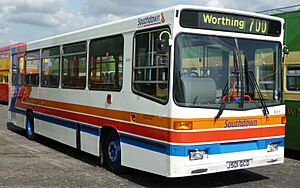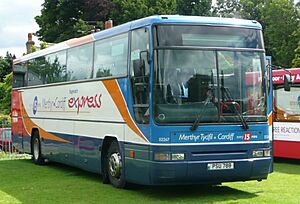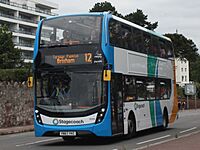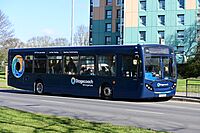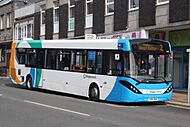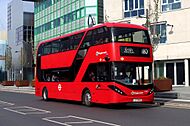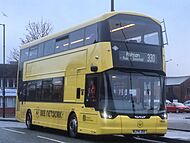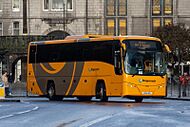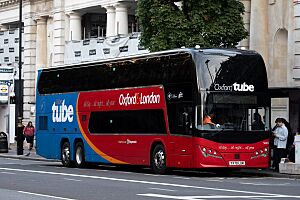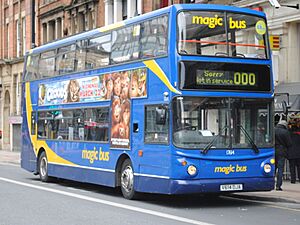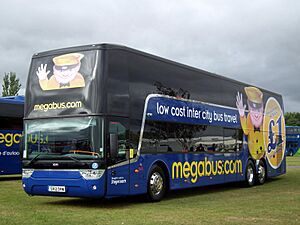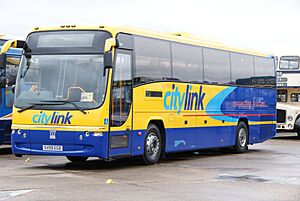Stagecoach Group facts for kids
 |
|
|
Formerly
|
Stagecoach Group plc |
|---|---|
| Private | |
| Industry | Public transport |
| Founded | 9 April 1980 |
| Founders | Brian Souter Ann Gloag Robin Gloag |
| Headquarters | Perth, Scotland, UK |
|
Area served
|
United Kingdom |
|
Key people
|
Ray O'Toole (Chairman) Claire Miles (Chief Executive) |
| Products | Bus, coach, tram and train services |
| Revenue | |
|
Operating income
|
|
|
Number of employees
|
24,000 (2023) |
| Parent | Inframobility (DWS Group) |
Stagecoach Group is a big transport company based in Perth, Scotland. It helps people travel around the United Kingdom by running buses and express coaches. They also used to operate trams and trains.
Stagecoach started small in 1976 as a business that rented out minibuses. In the early 1980s, new rules made it easier for companies to run long-distance bus services. Stagecoach quickly started offering trips from Dundee to London. They competed with bigger, state-owned companies like National Express Coaches. Over the years, Stagecoach bought many bus companies that used to be owned by the government. They even owned a company that leased trains for a while!
In 1997, Stagecoach began running the Sheffield Supertram system. They also bought Prestwick Airport in 1998, but later sold it to focus on buses and trains. After selling their London bus services in 2006, Stagecoach focused on other parts of the UK. They won contracts to run train services like East Midlands Trains and the Manchester Metrolink tram network.
In 2010, Stagecoach bought back their old London bus operations. They also ran a train service called Virgin Trains East Coast for a few years, but that contract ended early. In 2019, Stagecoach sold its business in the United States. A company called DWS Group bought Stagecoach in 2022.
Contents
How Stagecoach Started
The Early Days
The Stagecoach Group began in 1976. A woman named Ann Gloag and her husband, Robin Gloag, started a small business. They rented out RVs and minibuses in Perth, Scotland. Ann's brother, Brian Souter, who was an accountant, joined them. He helped the business grow into bus hire.
In 1982, Robin Gloag left the company. Around this time, new rules made it easier for bus companies to operate. This was a big help for Stagecoach. They started running long-distance bus services from Dundee to London. They used second-hand coaches for these trips. Brian Souter sometimes drove the buses himself, and Ann Gloag even made snacks for the passengers!
Between 1981 and 1985, Stagecoach grew a lot. They successfully competed against the state-owned National Express Coaches and Scottish Citylink. Stagecoach also started running local bus services. They bought several bus companies that were being sold by the government. By the 1990s, Stagecoach had bought many bus companies across the UK. In 1989, Stagecoach stopped running its own long-distance coach services and sold them to National Express.
Growing in the 1990s
When the British railway system was privatized, a company called Porterbrook was created. It owned about a third of all passenger trains in the UK and leased them to train operators. Stagecoach bought Porterbrook in 1996 for £825 million. Four years later, in 2000, Stagecoach sold Porterbrook for a much higher price, £1.44 billion.
In 1997, Stagecoach won the contract to operate the Sheffield Supertram system. This tram system had recently been privatized. Stagecoach took over the system for £1.15 million. When Stagecoach took over, the tram system was not doing well. But under Stagecoach, the number of passengers grew a lot. It went from 7.8 million journeys in 1996/97 to 15 million in 2011/12. Stagecoach operated the tram system until March 2024.
In 1998, Stagecoach also bought Prestwick Airport for £41 million. They thought about selling it for more money later. But in 2001, Stagecoach decided to sell the airport for £33 million. They wanted to focus more on bus and train transport.
Changes in the 2000s
In 2000, Stagecoach changed how its UK bus operations were organized. They also introduced a new "beachball" logo and new paint designs for their buses. The new design for regional buses had "swoops" of red, orange, blue, and white on a grey background. London buses kept their red base but had blue and orange swoops.
In 2005, Stagecoach sold its operations in New Zealand. They also bought Traction Group, a large independent bus company in the UK, for £26 million. After selling their London bus services in 2006, Stagecoach focused on growing their bus business outside London. They also started a joint venture with Scottish Citylink coaches.
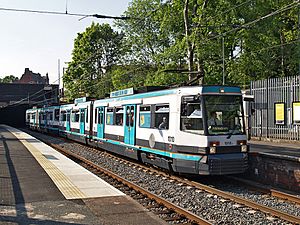
In 2007, Stagecoach won the contract to operate the new East Midlands Trains franchise. This combined several train services. In July 2007, Stagecoach also started running the Manchester Metrolink tram network. In 2009, Stagecoach bought Preston Bus, a rival company. However, they were told to sell it by the Competition Commission because it reduced competition.
The 2010s and Beyond
In October 2010, Stagecoach bought back its former London bus operations, East London and Selkent. In 2011, Stagecoach sold its Manchester Metrolink tram business. In 2013, they bought Norfolk Green, a bus company in King's Lynn.
In March 2015, Virgin Trains East Coast began operating the InterCity East Coast train franchise. Stagecoach owned 90% of this company. However, the contract ended early in June 2018 because the company could not make the agreed payments.
In April 2019, Stagecoach sold its US division for $271 million. Also in April 2019, Stagecoach was not allowed to bid for three new train contracts. This was because their bids did not meet the rules. Stagecoach said they would challenge this decision legally.
Recent Years (2020s)
In February 2020, Stagecoach changed its brand again. They introduced a new, simpler "beachball" logo. They also brought in new paint designs for their regional buses. There were three main color schemes:
- White with blue for local services.
- Amber yellow for longer distance services.
- White with ocean green for special services like park and ride.
They also added a slogan: "Proud to Serve." In 2024, Stagecoach started repainting buses into a single "steel blue" color. The slogan was changed to "We've got you."
In September 2021, it was reported that another company, National Express, wanted to buy Stagecoach. A deal was agreed in December 2021. However, a different company, DWS Group, made a better offer. In May 2022, DWS Group bought Stagecoach instead.
In June 2022, Stagecoach bought a bus garage in London from Tower Transit. This meant Stagecoach took over 150 buses and 11 bus routes. In August 2022, Stagecoach also bought the London operations of HCT Group. This added another 160 buses and 17 routes.
In September 2024, Stagecoach won a contract to operate buses in Guernsey. They will take over 20 public services and 24 school bus services starting from April 1, 2025.
What Stagecoach Does Now
Bus Services in the UK
Stagecoach runs many bus services across the UK. They have different divisions that cover various regions. Each division might have local brands. For example, Stagecoach East covers areas like Cambridge and Peterborough. Stagecoach London operates buses in the capital.
| Division | Headquarters | Local brands |
|---|---|---|
| Stagecoach Cumbria & North Lancashire | Carlisle | *Stagecoach in Cumbria
|
| Stagecoach East | Cambridge | *Stagecoach in Bedford
|
| Stagecoach East Midlands | Lincoln | *Stagecoach in Worksop
|
| Stagecoach East Scotland | Dunfermline | *Rennies Coaches
|
| Stagecoach London | Canning Town | * East London
|
| Stagecoach Manchester | Cheetham Hill | *Stagecoach in Manchester
|
| Stagecoach Merseyside & South Lancashire | Liverpool | * Stagecoach in Chester
|
| Stagecoach Midlands | Northampton | *Stagecoach in Warwickshire
|
| Stagecoach North East | Sunderland | *Stagecoach on Teesside
|
| Stagecoach Highlands | Inverness | *Stagecoach in Orkney
|
| Stagecoach Bluebird | Aberdeen | *Stagecoach in Aberdeen |
| Stagecoach South | Chichester | *Stagecoach in Hants & Surrey
|
| Stagecoach South East | Canterbury | *Stagecoach in East Kent
|
| Stagecoach South Wales | Cwmbran | *Stagecoach De Cymru
|
| Stagecoach South West | Exeter | *Stagecoach in Devon
|
| Stagecoach West | Gloucester | *Stagecoach in Cheltenham
|
| Stagecoach West Scotland | Ayr | *Stagecoach Western
|
| Stagecoach Yorkshire & Chesterfield | Barnsley | *Stagecoach in Yorkshire
|
Special Bus Brands
Stagecoach has some special brands for its bus services:
- Stagecoach Express – These are express coach services that connect towns and cities where Stagecoach operates. They usually don't compete directly with National Express.
- Oxford Tube – This is a very frequent coach service that runs 24 hours a day between Oxford and London. It is operated by Stagecoach West.
- Stagecoach Gold – This is a more luxurious bus service. It aims to attract people who might normally drive. Gold buses have a special blue and gold color, leather seats, and Wi-Fi. They are used on important routes.
How Buses Are Numbered
Stagecoach uses a numbering system for its buses that stays with the bus for its whole life with the company.
- 10000 – 19999: These are diesel-powered double-decker buses.
- 20000 – 29999: These are diesel-powered single-decker buses.
- 30000 – 39999: These are diesel-powered midibuses (medium-sized buses).
- 40000 – 49999: These are smaller diesel and electric minibuses.
- 50000 – 59999: These numbers are for coaches.
- 60000 – 69999: This group includes New Routemasters, electric midibuses, and other special vehicles.
- 70000 – 79999: These are electric single-decker buses.
- 80000 – 89999: These are electric and other alternative fuel double-decker buses.
- 90000 – 99999: These are for company cars and staff transport vehicles.
Past Operations
Stagecoach has operated many different transport services in the past.
Train Services
- East Midlands Trains: Stagecoach ran this train service from November 2007 until August 2019.
- South West Trains: Stagecoach operated this train franchise from February 1996 to August 2017. This also included the Island Line Trains on the Isle of Wight.
- Virgin CrossCountry: Stagecoach had a share in Virgin Rail Group, which operated this service from January 1997 to November 2007.
- Virgin Trains East Coast: Stagecoach owned 90% of this company. It ran the InterCity East Coast franchise from March 2015 to June 2018.
- Virgin Trains West Coast: Stagecoach had a 49% share in Virgin Rail Group, which operated this service from March 1997 to December 2019.
Tram Services
- Manchester Metrolink: Stagecoach operated this tram network from July 2007. They sold the business in August 2011.
- Sheffield Supertram:
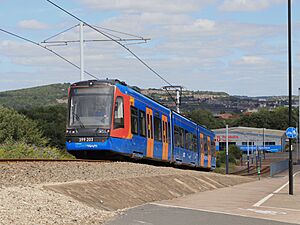 A Sheffield Supertram in July 2020.
A Sheffield Supertram in July 2020.
Stagecoach operated the Sheffield Supertram system from 1997 to March 2024. The number of people using the tram grew a lot under Stagecoach.
International Operations
Stagecoach also operated transport services in other countries:
- Australia: In 1999, Stagecoach bought school bus operations in Queensland, Australia. They sold these in 2002.
- Hong Kong: Stagecoach had a bus company in Hong Kong from 1994 to 1996. In 1999, they bought Citybus, a large bus company in Hong Kong. They sold Citybus in 2003.
- Kenya: In 1991, Stagecoach bought a share in Kenya Bus Services. They sold this in 1998.
- New Zealand: Stagecoach New Zealand was the biggest bus company in New Zealand. It operated buses and ferries. Stagecoach sold this business in 2005.
- North America: Stagecoach operated buses in parts of the United States and Canada. This included commuter services, tours, and school buses. They sold all their North American operations in April 2019.
- Portugal: Stagecoach operated bus services in Portugal from 1995. They sold these operations in 2001.
- Nordic countries: In 1996, Stagecoach bought Swebus AB, a bus company in Sweden. This company also had operations in Denmark, Finland, and Norway. Stagecoach sold Swebus in 1999.
Budget-Friendly Brands
Stagecoach runs some "no-frills" services. These services aim to offer cheaper travel options by keeping costs low. They often have very low fares if you book early.
Magic Bus
Magic Bus was Stagecoach's first budget-friendly brand. It used older buses with simple fares. It was often used on routes where there was a lot of competition from other bus companies. By 2012, only the Magic Bus service in Manchester was still running.
Megabus
Megabus is a low-cost coach service. Stagecoach launched it in the UK in 2003. It also started in the United States in 2006 and Canada in 2009. Megabus competes with other coach companies by offering very cheap tickets. To save money, Megabus often uses bus stops on the street instead of expensive coach stations.
Megatrain
Megatrain started in 2005. It extended the Megabus idea to some train services. It offered cheaper train tickets on certain South West Trains and later East Midlands Trains services. In 2009, they introduced Megabusplus, where part of the trip is by train and part by bus.
Scottish Citylink
In 2005, Stagecoach and another company, ComfortDelGro, started a joint venture for express coach services in Scotland. This ended the strong competition between Stagecoach's Megabus and Scottish Citylink. Stagecoach gained a 35% share in Scottish Citylink Coaches Ltd. The Competition Commission later said this reduced competition too much. To fix this, some Citylink routes were sold to another company in 2008.
Guided Busway
Stagecoach operates buses on the Cambridgeshire Guided Busway. This is a special track where buses can drive hands-free. Guide wheels on the side of the buses keep them on the track. This allows for higher speeds and increased safety because buses are separated from other traffic.
|
 | Claudette Colvin |
 | Myrlie Evers-Williams |
 | Alberta Odell Jones |


